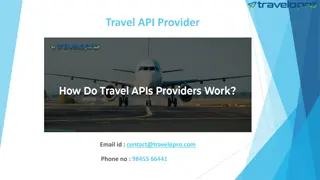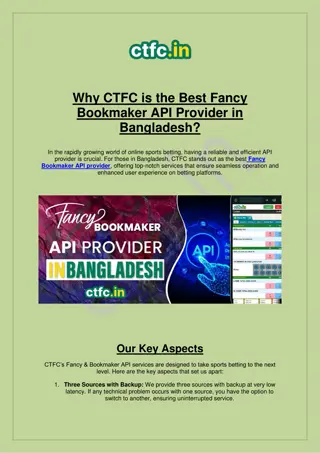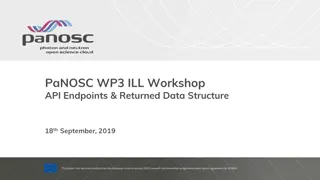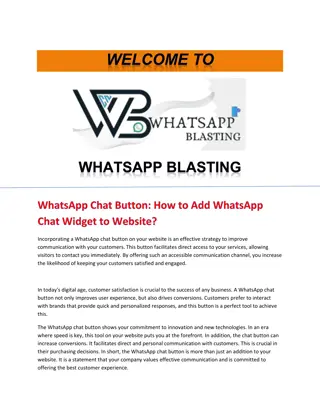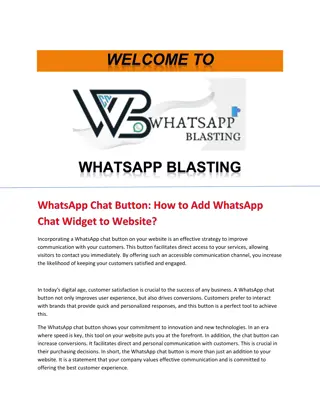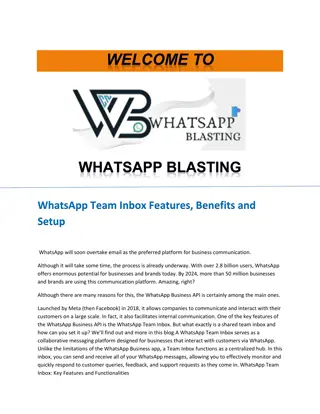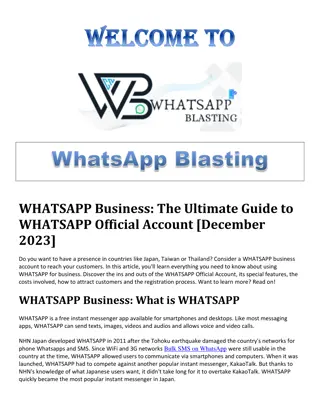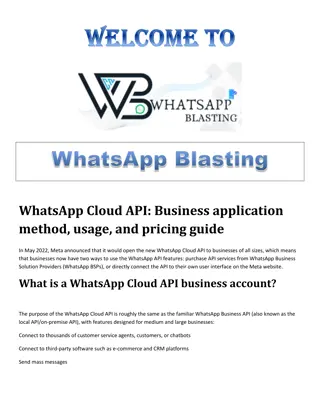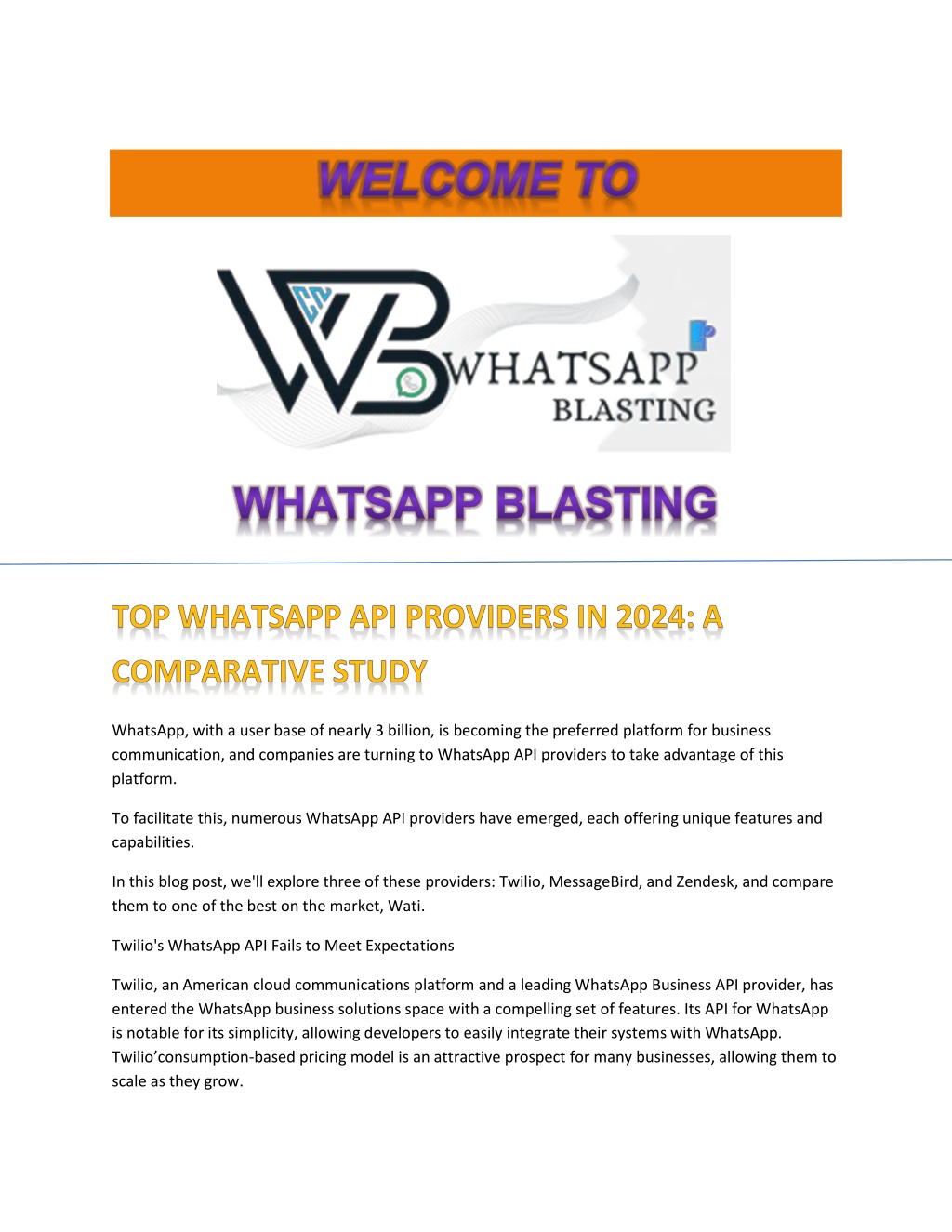
Top WhatsApp API Providers in 2024 A Comparative Study
Explore the top WhatsApp API providers like Twilio, MessageBird, Zendesk and the innovative Wati in this comparison studyn
Download Presentation

Please find below an Image/Link to download the presentation.
The content on the website is provided AS IS for your information and personal use only. It may not be sold, licensed, or shared on other websites without obtaining consent from the author. Download presentation by click this link. If you encounter any issues during the download, it is possible that the publisher has removed the file from their server.
E N D
Presentation Transcript
WhatsApp, with a user base of nearly 3 billion, is becoming the preferred platform for business communication, and companies are turning to WhatsApp API providers to take advantage of this platform. To facilitate this, numerous WhatsApp API providers have emerged, each offering unique features and capabilities. In this blog post, we'll explore three of these providers: Twilio, MessageBird, and Zendesk, and compare them to one of the best on the market, Wati. Twilio's WhatsApp API Fails to Meet Expectations Twilio, an American cloud communications platform and a leading WhatsApp Business API provider, has entered the WhatsApp business solutions space with a compelling set of features. Its API for WhatsApp is notable for its simplicity, allowing developers to easily integrate their systems with WhatsApp. Twilio consumption-based pricing model is an attractive prospect for many businesses, allowing them to scale as they grow.
However, Twilio has its limitations. 1. Technical Expertise Required: Implementing Twilio s WhatsApp API or building a WhatsApp Chatbot may require technical expertise Bulk SMS on WhatsApp or the assistance of a developer. This is mainly because Twilio s no-code interface involves a fair amount of coding. This can be challenging for non- technical business owners or small businesses without dedicated technical teams, which could limit accessibility. Screenshot showing how you need to code for creating a WhatsApp chatbot on Twilio 2. Lack of Integrated CRM: Twilio s WhatsApp API does not include an integrated Customer Relationship Management (CRM) system. As a result, businesses need to invest in a separate CRM tool to manage customer interactions, which can add complexity and costs. 3. Limited Customer Support: Twilio s customer support may not be sufficient for businesses looking for more extensive guidance and assistance, as it primarily offers basic support. Additionally, Twilio currently lacks a mobile app for WhatsApp Business services, limiting its accessibility and ease of use.
These factors combined could make Twilio a less attractive WhatsApp API provider for businesses requiring more comprehensive support and mobile accessibility. 4. Scalability Challenges: Twilio has certain limitations when it comes to scaling messaging on WhatsApp. The default messaging throughput is limited to 80 messages per second (MPS) per WhatsApp sender for outbound traffic. While this can be increased to 400 MPS for text-only messaging, it requires prior approval following review of the company s messaging requirements. If messages are sent at a rate greater than the configured capacity, they are placed in a delivery queue, but this queue has a maximum delivery time limit of four hours. Messages that remain in the queue for more than four hours will fail. To deliver large volumes of messages, businesses should use Messaging Services to distribute traffic across multiple senders. In contrast, official WhatsApp API providers like Twilio do not have a daily limit on the number of messages sent, as they are pay-as-you-go services. However, WhatsApp does impose tiers on the number of unique recipients per day as businesses increase their usage. Overall, Twilio s WhatsApp API offers a solid foundation for businesses to leverage the power of WhatsApp for their communication needs. However, the technical expertise required and the lack of an integrated CRM system could be disadvantages for some businesses. Hailing from the Netherlands, this WhatsApp API provider offers a robust platform that integrates seamlessly with WhatsApp. Its omnichannel capabilities ensure that businesses can manage multiple communication channels in one centralized place. Additionally, MessageBird offers a feature-rich, integrated CRM, allowing businesses to maintain a comprehensive database of their customers. Messagebird Homepage On the other hand, MessageBird s API is quite complex compared to other WhatsApp API providers, requiring a steep learning curve for developers. Its pricing, while competitive, can still be prohibitive for small businesses. 1. Complex API: MessageBird s API for WhatsApp can be quite complex, requiring a steep learning curve for developers. This complexity can present a challenge for companies that lack technical expertise or dedicated development resources.
2. Pricing Limitations: While MessageBird offers competitive pricing, it can still be prohibitive for small businesses with limited budgets. The cost of using MessageBird s WhatsApp solutions might not be aligned with the financial capabilities of all businesses. 3. Lack of Personalization: MessageBird s WhatsApp solutions may have limitations when it comes to customization options. Businesses looking for highly personalized communication experiences may find the platform s customization capabilities restrictive. 4. No Free Trial: Another drawback is that MessageBird does not offer a free trial specifically for its WhatsApp Business API service. While it does provide a free trial with a 10 credit for new users to explore other MessageBird services, this may not be enough for businesses to fully evaluate the features and capabilities of the WhatsApp API. In summary, while MessageBird s WhatsApp solutions showcase omnichannel capabilities and an integrated CRM system, they fall short in certain areas. The complex API, potential pricing limitations, and limited customization options can hamper the overall user experience and suitability for businesses with specific needs. Zendesk, a well-known customer service software company, has a WhatsApp business solution that is easy to use and integrates seamlessly with other Zendesk solutions. The main strength of this WhatsApp API provider lies in its powerful customer support features, making it a good choice for businesses with high customer engagement. Screenshot of Zendesk's Meta service page However, like Twilio, Zendesk does not offer an integrated CRM for WhatsApp, which incurs additional costs for businesses. Additionally, its WhatsApp Business solution is part of a broader suite, which could be overwhelming for businesses looking for a simple, standalone WhatsApp solution. 1. Lack of Integrated CRM: Zendesk s WhatsApp business solution does not offer an integrated Customer Relationship Management (CRM) system. Businesses must rely on external tools or invest in additional CRM software, which adds complexity and potential integration challenges. 2. Overwhelming Suite of Tools: Zendesk s WhatsApp business solution is part of a broader suite of software offerings. This all-in-one approach can be overwhelming for businesses looking for a simple, standalone WhatsApp solution, potentially leading to unnecessary complexity and additional costs.
3. Cost Considerations: Zendesk's pricing structure may not be suitable for all businesses, especially smaller businesses or those with budget constraints. The cost of using Zendesk's WhatsApp business solution may exceed the financial capabilities of certain companies. 4. Complex Setup Process: The setup process for integrating WhatsApp with Zendesk involves several steps, including creating a Meta Business Manager and connecting multiple WhatsApp business accounts to a single Zendesk account. In conclusion, while Zendesk s WhatsApp business solution emphasizes customer support and integration with its software suite, it fails in several aspects. The lack of an integrated CRM system, the overwhelming suite of tools, and potential cost considerations can present challenges and limitations for businesses considering Zendesk as their WhatsApp solution provider. Wati: A Revolutionary WhatsApp API Provider Wati sets itself apart by addressing key shortcomings of Zendesk, Twilio, and MessageBird, offering a more streamlined and easy-to-use WhatsApp API solution. Unlike Twilio, Wati requires minimal technical knowledge and includes a built-in CRM, simplifying customer relationship management and reducing costs. Its simple API, unlike MessageBird's complex interface, is easy to implement, with a pricing model that suits small and medium-sized businesses.
Additionally, Wati focuses solely on WhatsApp solutions, avoiding Zendesks overwhelming suite of tools, providing a robust yet simple communication platform for businesses. Advantages of using Wati's WhatsApp business solution: 1. User-Friendly Interface: Wati stands out for its intuitive and user-friendly interface. The platform is designed for users of all technical levels, making it accessible and easy to navigate. Businesses can quickly adapt and leverage the power of WhatsApp without needing extensive technical knowledge. GIF showing drap & drop feature of Wati's flow builder 2. Comprehensive Feature Suite: Wati offers a comprehensive feature suite that caters to various business needs. From seamless integration with existing systems to Team Shared Inbox, Click-to- WhatsApp Ads, Custom Notifications, Catalog, to advanced messaging capabilities and Bulk Message automation, Wati provides a versatile tool for businesses to maximize their WhatsApp communication.3. Integrated CRM for Efficient Customer Management: Wati s WhatsApp business solution includes an integrated Customer Relationship Management (CRM) system. This integration allows businesses to simplify customer management directly from the platform, eliminating the need for separate CRM tools. The integrated CRM allows businesses to track and manage customer interactions, resulting in improved relationships. 4. Competitive Pricing Model: Wati adopts a competitive pricing model, ensuring that businesses of all sizes can take advantage of its powerful WhatsApp solution without breaking the bank. Affordability makes Wati an attractive option, especially for small and medium-sized businesses looking for a cost- effective yet robust WhatsApp business solution. 5. Exceptional Customer Support: Wati stands out for its exceptional customer support. Its dedicated team is available around the clock to provide prompt assistance, resolve issues, and guide businesses through the implementation and use of the WhatsApp solution. This high-level support ensures smooth operation and customer satisfaction. In short, Wati shines as a game-changer in the WhatsApp business solutions space. Its easy-to-use interface, comprehensive feature set, built-in CRM, competitive pricing, and outstanding customer support set it apart from the competition. Wati s dedication to empowering businesses with an exceptional WhatsApp communication platform reinforces its position as an industry leader. Conclusion: While Twilio, MessageBird, and Zendesk all offer laudable WhatsApp business solutions, each has its own limitations. Wati, on the other hand, offers a comprehensive solution that fits a wide range of business needs.
Its easy-to-use API, built-in CRM, competitive pricing, and exceptional customer support make it one of the best WhatsApp business solution providers in the world. As businesses continue to evolve their communication practices, providers like Wati will play an increasingly significant role in driving success. 1. What factors should businesses consider when choosing a WhatsApp API provider? Ease of Integration How well does the WhatsApp API connect to your current business systems? Look for vendors that offer pre-built connectors or well-documented APIs for developers. An easy-to-use interface for managing contacts, messages and campaigns is also an added value. Customer Support Reliable customer support is essential, especially during initial setup and troubleshooting. Consider factors such as response times, available support channels (phone, email, live chat), and the vendor's experience with WhatsApp business solutions. Pricing Models There are several pricing structures: per message, monthly subscription, or tiered plans based on message volume.
Choose a model that aligns with your business needs and budget. Beware of hidden costs and ensure a transparent pricing policy. Scalability Options As your business grows, so will your WhatsApp communication needs. Look for a provider whose API can scale to handle your growing message volume and user base. Essential Features Integrated CRM Systems: Efficiently manage customer interactions by integrating your WhatsApp communication with a CRM system within the API. This will allow you to store customer data, track communication history, and personalize interactions. Omnichannel Capabilities: Provide a seamless customer experience by allowing conversations to flow between WhatsApp and other communication channels (email, SMS, etc.) offered by the provider. By carefully evaluating these factors, businesses can choose a WhatsApp API provider that enables them to connect with their customers on their preferred platform and streamline communication workflows. How can businesses ensure the security and privacy of their communications when choosing a WhatsApp API provider? Businesses using WhatsApp Business API solutions should prioritize security and privacy. Look for providers that offer end-to-end encryption, a fundamental foundation of secure communication. But security goes beyond that. Opt for providers with strong data storage practices that comply with data protection regulations. Additionally, train your employees on data handling and implement two-factor authentication for added security. Consider solutions to monitor suspicious activity and data breaches. By prioritizing these aspects, businesses can ensure a safe WhatsApp environment for both themselves and their customers. 3. What types of businesses benefit most from using WhatsApp Business API solutions? Businesses with high customer interaction, such as e-commerce, customer service-oriented businesses, and those that need real-time communication with their customers, can significantly benefit from using WhatsApp Business solutions.
Migrating from one WhatsApp API provider to another typically involves exporting and importing contact lists, setting up new API integrations, configuring message templates, and ensuring data compliance. Businesses should also seek support from the new provider to facilitate a smooth transition. WhatsApp groups are an essential tool in various sectors, especially in training companies, mentoring and sports clubs. WhatsApp Business helps create communities and foster connections between individuals with common interests. These groups are ideal for resolving queries and addressing objections in an interactive environment. Valuable content, such as articles or videos, can be shared to enrich the experience of participants. Resolve doubts and address objections. Share valuable content. Notify about new lessons or classes available (in training and mentoring). Provide a networking channel in the B2B sector or connect people with similar interests. In the field of training and mentoring, WhatsApp groups are perfect for announcing new lessons or available classes. They also allow you to present complementary products and services in a direct and personalized way. To build customer loyalty, WhatsApp groups can be used to organize raffles or offer special deals. They also provide an excellent channel for networking in the B2B sector, or for connecting people with similar interests in different fields. To ensure good use of these groups, it is important to establish clear rules from the beginning and designate administrators responsible for moderating content and sharing updates. This ensures an orderly and productive environment, benefiting all group members. Broadcast lists on WhatsApp have revolutionized the way different industries communicate with their audiences. This chapter explores how different sectors are taking advantage of this tool to improve their communication and marketing.
In the Retail Sector : Stores use mailing lists to send exclusive offers, new product announcements and flash sale alerts. For example, a fashion boutique can announce a new collection only to its most loyal customers. In the Service Industry : Service companies, such as travel agencies, send customized itineraries and last- minute travel deals. This allows them to offer a more personal and efficient service. In the Educational Setting : Educational institutions leverage lists to send class reminders, additional study material, and notifications of school events, keeping students and parents informed and engaged. In the Healthcare Sector : Clinics and hospitals send appointment reminders, health tips, and important updates on health services. This practice helps improve patient care and time management. In Real Estate : Agents and real estate companies leverage mailing lists to send updates about new properties, tips for buyers and sellers, and housing market news. This direct, personalized communication helps keep clients informed and engaged in the buying or selling processEach industry customizes the use of WhatsApp broadcast lists to their needs. This leads to more direct and personal communication, increasing customer satisfaction and business growth. Contact Us Website: https://www.blastingws.com Telegram: https://t.me/latestdat Whatsapp: 639858085805 Phone: 639858085805 Email:info@blastingws.com Address: Blk 34 Lot 5 Easthomes 3 Subd Estefania, Bacolod City, Philippines,6100







